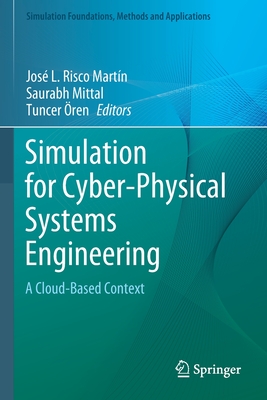Netcentric System of Systems Engineering with Devs Unified Process
暫譯: 網絡中心系統的系統工程與開發統一過程
Mittal, Saurabh, Risco Martin, Jose L.
相關主題
商品描述
In areas such as military, security, aerospace, and disaster management, the need for performance optimization and interoperability among heterogeneous systems is increasingly important. Model-driven engineering, a paradigm in which the model becomes the actual software, offers a promising approach toward systems of systems (SoS) engineering. However, model-driven engineering has largely been unachieved in complex dynamical systems and netcentric SoS, partly because modeling and simulation (M&S) frameworks are stove-piped and not designed for SoS composability. Addressing this gap, Netcentric System of Systems Engineering with DEVS Unified Process presents a methodology for realizing the model-driven engineering vision and netcentric SoS using DEVS Unified Process (DUNIP).
The authors draw on their experience with Discrete Event Systems Specification (DEVS) formalism, System Entity Structure (SES) theory, and applying model-driven engineering in the context of a netcentric SoS. They describe formal model-driven engineering methods for netcentric M&S using standards-based approaches to develop and test complex dynamic models with DUNIP. The book is organized into five sections:
- Section I introduces undergraduate students and novices to the world of DEVS. It covers systems and SoS M&S as well as DEVS formalism, software, modeling language, and DUNIP. It also assesses DUNIP with the requirements of the Department of Defense's (DoD) Open Unified Technical Framework (OpenUTF) for netcentric Test and Evaluation (T&E).
- Section II delves into M&S-based systems engineering for graduate students, advanced practitioners, and industry professionals. It provides methodologies to apply M&S principles to SoS design and reviews the development of executable architectures based on a framework such as the Department of Defense Architecture Framework (DoDAF). It also describes an approach for building netcentric knowledge-based contingency-driven systems.
- Section III guides graduate students, advanced DEVS users, and industry professionals who are interested in building DEVS virtual machines and netcentric SoS. It discusses modeling standardization, the deployment of models and simulators in a netcentric environment, event-driven architectures, and more.
- Section IV explores real-world case studies that realize many of the concepts defined in the previous chapters.
- Section V outlines the next steps and looks at how the modeling of netcentric complex adaptive systems can be attempted using DEVS concepts. It touches on the boundaries of DEVS formalism and the future work needed to utilize advanced concepts like weak and strong emergence, self-organization, scale-free systems, run-time modularity, and event interoperability.
This groundbreaking work details how DUNIP offers a well-structured, platform-independent methodology for the modeling and simulation of netcentric system of systems.
商品描述(中文翻譯)
在軍事、安全、航空航天和災害管理等領域,性能優化和異構系統之間的互操作性需求日益重要。模型驅動工程(Model-driven engineering)是一種將模型轉化為實際軟體的範式,為系統的系統(System of Systems, SoS)工程提供了一種有前景的方法。然而,模型驅動工程在複雜動態系統和網絡中心的SoS中大多未能實現,部分原因是建模和模擬(Modeling and Simulation, M&S)框架是孤立的,並未設計為SoS的可組合性。為了解決這一差距,《網絡中心系統的系統工程與DEVS統一過程》(Netcentric System of Systems Engineering with DEVS Unified Process)提出了一種實現模型驅動工程願景和網絡中心SoS的方法論,使用DEVS統一過程(DEVS Unified Process, DUNIP)。
作者基於他們在離散事件系統規範(Discrete Event Systems Specification, DEVS)形式、系統實體結構(System Entity Structure, SES)理論以及在網絡中心SoS背景下應用模型驅動工程的經驗,描述了基於標準的方法進行網絡中心M&S的正式模型驅動工程方法,旨在開發和測試基於DUNIP的複雜動態模型。本書分為五個部分:
第一部分介紹本科生和新手進入DEVS的世界。涵蓋系統和SoS的M&S,以及DEVS形式、軟體、建模語言和DUNIP。還評估了DUNIP與美國國防部(Department of Defense, DoD)開放統一技術框架(Open Unified Technical Framework, OpenUTF)對於網絡中心測試和評估(Test and Evaluation, T&E)的要求。
第二部分深入探討基於M&S的系統工程,面向研究生、高級從業者和行業專業人士。提供將M&S原則應用於SoS設計的方法論,並回顧基於如美國國防部架構框架(Department of Defense Architecture Framework, DoDAF)等框架開發可執行架構的過程。還描述了一種構建網絡中心知識驅動的應急系統的方法。
第三部分指導研究生、高級DEVS用戶和對構建DEVS虛擬機和網絡中心SoS感興趣的行業專業人士。討論建模標準化、在網絡中心環境中部署模型和模擬器、事件驅動架構等主題。
第四部分探討實際案例研究,實現了前幾章中定義的許多概念。
第五部分概述了下一步的計劃,並探討如何使用DEVS概念嘗試建模網絡中心複雜自適應系統。觸及DEVS形式的邊界以及未來需要利用弱和強出現、自我組織、無尺度系統、運行時模組化和事件互操作性等先進概念的工作。
這部開創性的著作詳細說明了DUNIP如何提供一種結構良好、平台獨立的方法論,用於網絡中心系統的系統的建模和模擬。
作者簡介
Saurabh Mittal is the founder and principal scientist at Dunip Technologies, which he manages in his free time. He is currently a full-time research scientist at L-3 Communications and is a contractor to the U.S. Air Force Research Laboratory, Wright-Patterson Air Force Base, Ohio. In this capacity, he is working on large-scale cognitive M&S, cognitive domain ontologies extending SES theory, and various other cross-directorate M&S integration and interoperability efforts using architecture frameworks such as the Department of Defense Architecture Framework (DoDAF). He is a recipient of the highest civilian contractor recognition, the "Golden Eagle" award, by the Joint Interoperability Test Command, Defense Information Systems Agency, U.S. DoD. He serves on various conference program committees and is a reviewer for many prestigious international journals. He is also interested in open systems research, artificial intelligence, complex adaptive systems, metamodeling, and systems interoperability.
José L. Risco Martín is an associate professor in the Computer Architecture and Automation Department of Universidad Complutense de Madrid (UCM), Spain. His research interests focus on the design methodologies for integrated systems and high-performance embedded systems, including new modeling frameworks to explore thermal management techniques for multiprocessor system-on-chip, novel architectures for logic and memories in forthcoming nanoscale electronics, dynamic memory management and memory hierarchy optimizations for embedded systems, networks-on-chip interconnection design, and low-power design of embedded systems. He is also interested in theory of M&S, with an emphasis on DEVS, and the application of bioinspired optimization techniques in computer-aided design problems.
作者簡介(中文翻譯)
Saurabh Mittal 是 Dunip Technologies 的創辦人及首席科學家,他在空閒時間管理這家公司。他目前是 L-3 Communications 的全職研究科學家,同時也是美國空軍研究實驗室(Wright-Patterson 空軍基地,俄亥俄州)的承包商。在這個角色中,他正在從事大規模的認知模擬與建模(M&S)、擴展 SES 理論的認知領域本體,以及使用如美國國防部架構框架(DoDAF)等架構框架進行的各種跨部門 M&S 整合與互操作性工作。他是美國國防部聯合互操作性測試指揮部(Joint Interoperability Test Command)、國防資訊系統局(Defense Information Systems Agency)頒發的最高民間承包商榮譽「金鷹獎」的獲得者。他參與各種會議的程序委員會,並擔任許多知名國際期刊的審稿人。他還對開放系統研究、人工智慧、複雜適應系統、元建模和系統互操作性感興趣。
José L. Risco Martín 是西班牙馬德里康普頌斯大學(Universidad Complutense de Madrid, UCM)計算機架構與自動化系所的副教授。他的研究興趣集中在集成系統和高效能嵌入式系統的設計方法論上,包括探索多處理器系統單晶片的熱管理技術的新建模框架、即將到來的納米級電子產品中邏輯和記憶體的新架構、嵌入式系統的動態記憶體管理和記憶體層次優化、片上網路互連設計,以及嵌入式系統的低功耗設計。他還對模擬與建模的理論感興趣,特別是 DEVS,並應用生物啟發的優化技術於計算機輔助設計問題中。











